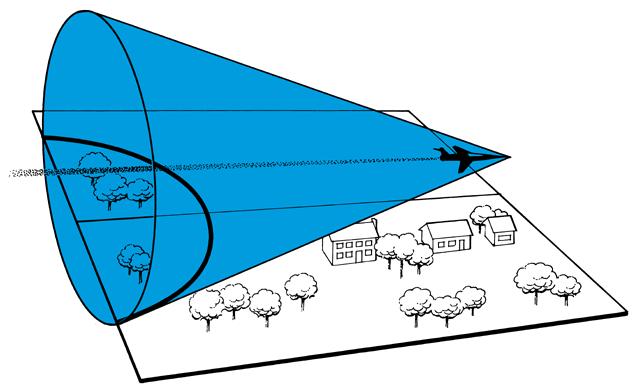1. Dulles Airport
Dulles Airport, designed by Eero Saarinen, is in the
shape of a hyperbolic paraboloid. The hyperbolic paraboloid is a three-dimensional
curve that is a hyperbola in one cross-section, and a parabola in another cross
section.

2. Lampshade
A household lamp casts hyperbolic shadows on a wall.

3. Gear transmission
Two hyperboloids of revolution can provide gear
transmission between two skew axes.
The cogs of each gear are a set of generating
straight lines.

4. Sonic Boom
In 1953, a pilot flew over an Air Force Base flying faster than the speed of sound. He damaged every building on the base.
As the plane moves faster than the speed of sound, you get a cone-like wave. Where the cone intersects the ground, it is an hyperbola.
The sonic boom hits every point on that curve at the same time. No sound is
heard outside the curve. The hyperbola is known as the "Sonic Boom Curve."
In the picture below, the sonic boom is "visible" due to the humidity.
The photo below was taken by Ensign John Gay, U.S. Navy from the aircraft
carrier Constellation. Sports Illustrated and Life both ran the photo.
Comparing Speeds in Miles per Hour
| Human Walking | 3 mph |
| Human Running | 34.3 mph |
| Race Horse | 44.9 mph |
| Cheetah Running | 65 mph |
| Car on Interstate Highway in Colorado | 75 mph |
| Fastest Train | 250 mph |
| Passenger Jetliner (McDonald Douglas DC-9) |
575 mph |
| Speed of Sound (At sea level, 59 degrees) |
761 mph |
| Concorde | 1,450 mph |
| Fastest Jet Fighter | 4,500 mph |
| Space Shuttle in Orbit | 17,000 mph |
5. Cooling Towers of Nuclear Reactors and Coal-fired Power Plants
The hyperboloid is the design standard for all nuclear
cooling towers and some coal-fired power plants. It is structurally
sound and can be built with straight steel beams.
When designing these cooling towers, engineers are faced with two problems:
(1) the structutre must be able to withstand high winds and
(2) they should be built with as little material as possible.
The hyperbolic form solves both of these problems. For a given diameter and height of
a tower and a given strength, this shape requires less material than any other form.
A 500 foot tower can be made of a reinforced concrete shell only six or eight inches wide.
See the pictures below of the F. B. Culley Generating Station, a 369-MWe coal-fired electricity-generating power plant.
Thanks to Michael Linch for pointing out that this was not a nuclear power plant!


6. Hyperbolas from 3-dimensional shapes


7. Stones in a Lake
When two stones are thrown simultaneously into
a pool of still water, ripples move outward in concentric circles.
These circles intersect in points which form a curve known as the hyperbola.

